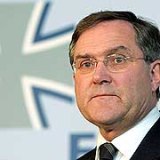Germany disagrees with US over use of NATO's rapid response force
 Krakow, Poland - German Defence Minister Franz Josef Jung said Thursday he opposed US plans to use NATO's embryonic Response Force (NRF) to provide security in Afghanistan during the country's presidential elections.
Krakow, Poland - German Defence Minister Franz Josef Jung said Thursday he opposed US plans to use NATO's embryonic Response Force (NRF) to provide security in Afghanistan during the country's presidential elections.
"The NRF should not be considered as a reserve force. In principle, it has a very different role to play," Jung told reporters ahead of a meeting of NATO defence ministers in Krakow, Poland.
Other European allies are understood to also oppose the deployment of the NRF in Afghanistan.
Launched at the alliance's 2002 summit in Prague and declared operational four years later, the NRF is designed to provide NATO with a rapid and flexible stand-alone force consisting of land, air and sea components and capable of being deployed within five days anywhere in the world.
But disagreements about its mission and widespread unwillingness to provide it with troops have prevented its use in any combat zone.
It has so far been used only a handful of times, and only for humanitarian relief purposes, such as when Hurricane Katrina hit the southern US in 2005.
Original plans for a 25,000-strong contingent have long been abandoned, with NATO officials now talking about the need to create a permanent "core" surrounded by a flexible amount of troops.
Speaking on his way to Krakow, US Defence Secretary Robert Gates proposed deploying the NRF before and during Afghan's presidential elections, which are expected to take place in mid-August.
"We believe the NRF ought to be deployable. And I think that it's hard to get people to commit definitely to meet their NRF responsibilities if there's no notion that they'll ever be used anyplace," Gates said.
"And so my view is this pre-election period in Afghanistan is a very good example of where the NRF could provide a temporary strengthening of NATO's capabilities in support of the Afghan government and the elections," he said.
Meanwhile, his British colleague, John Hutton, said he would use the Krakow meeting to propose the creation of a 3,000-strong standing force committed to defending the alliance's territory against attack.
The idea is to reassure NATO's Eastern European allies in the wake of Russia's invasion of Georgia last August and to free up additional resources for Afghanistan.
Hutton said agreement on such a domestic security force could also break the deadlock over the NRF.
"I hope it might make it easier for NATO to do more in Afghanistan, certain in the knowledge that there is a dedicated homeland security force that will have no other call on its priorities (other) than European homeland security," Hutton told the Financial Times. (dpa)